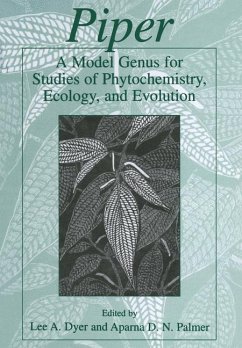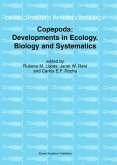Piper is an economically and ecologically important genus of plant that includes a fascinating array of species for studying natural history, natural products chemistry, community ecology, and evolutionary biology. The diversification of this taxon is unique and of great importance in understanding the evolution of plants.
The diversity and ecological relevance of this genus makes it an obvious candidate for ecological and evolutionary studies, but surprisingly, most research on Piper spp. to-date has focused on the more economically important plants P. nigrum (black pepper), P. methysticum (kava), and P. betle (betel leaf). While this book does address the applied techniques of studying Piper, its focus is more on Piper in its natural setting. Piper: A Model Genus for Studies of Phytochemistry, Ecology, and Evolution synthesizes existing data and provides an outline for future investigations of the chemistry, ecology, and evolution of this taxon, while examining its key themes of Piper as a model genus for ecological and evolutionary studies, the important ecological roles of Piper species in lowland wet forests, and the evolution of distinctive Piper attributes.
This volume has a place in the libraries of those studying or working in the fields of ecology, evolutionary biology, natural products chemistry, invasive species biology, pharmaceutics, and ethnobotany.
Hinweis: Dieser Artikel kann nur an eine deutsche Lieferadresse ausgeliefert werden.
The diversity and ecological relevance of this genus makes it an obvious candidate for ecological and evolutionary studies, but surprisingly, most research on Piper spp. to-date has focused on the more economically important plants P. nigrum (black pepper), P. methysticum (kava), and P. betle (betel leaf). While this book does address the applied techniques of studying Piper, its focus is more on Piper in its natural setting. Piper: A Model Genus for Studies of Phytochemistry, Ecology, and Evolution synthesizes existing data and provides an outline for future investigations of the chemistry, ecology, and evolution of this taxon, while examining its key themes of Piper as a model genus for ecological and evolutionary studies, the important ecological roles of Piper species in lowland wet forests, and the evolution of distinctive Piper attributes.
This volume has a place in the libraries of those studying or working in the fields of ecology, evolutionary biology, natural products chemistry, invasive species biology, pharmaceutics, and ethnobotany.
Hinweis: Dieser Artikel kann nur an eine deutsche Lieferadresse ausgeliefert werden.
From the reviews: "This slim volume approaches comparative biology from a perspective rarely seen in book-length treatments. ... The book's premise is that species-rich lineages such as Piper are convenient models for studying questions of general interest using comparative methods. ... The book is generally well edited ... . The book is also attractively produced. ... How well does the book do in attaining its objectives? Fairly well, given the gaps that exist in our knowledge of the genus." (Doyle McKey, Ecology, Vol. 86 (7), 2005)








